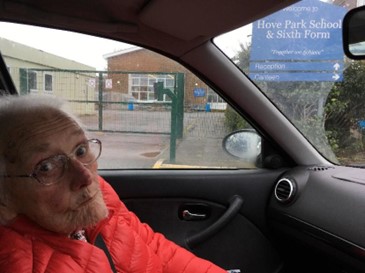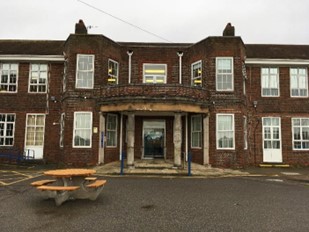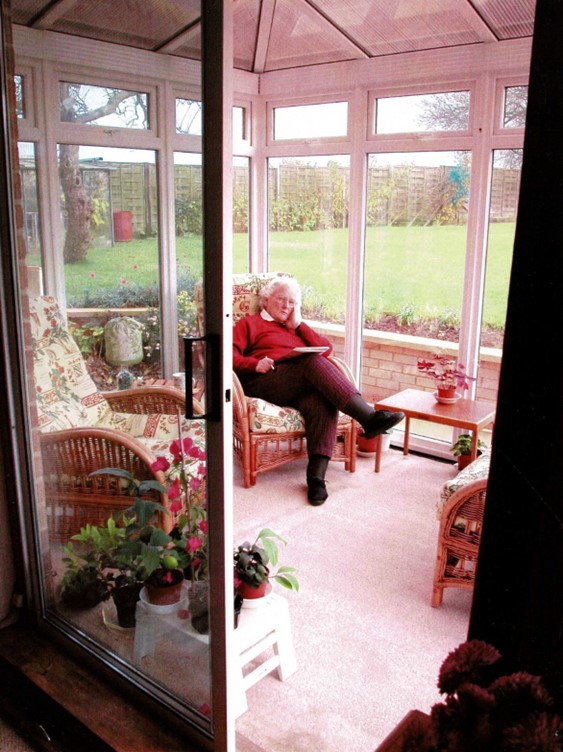


www.morsecodebeaumanor.com

-- --- .-. ... . -.-. --- -.. . -... . .- ..- -- .- -. --- .-. .-.-.- -.-. --- --
CLICK ARROW TO HEAR SITE TITLE IN MORSE CODE
Dina Markwick (Jones)21st May 1922 – 9th April 2021
I knew that my Mum kept a diary of all holidays she had been on with my Dad when retired, but until only recently did I find out that she had kept notes of previous times in her life. She had always said “I shall have to write my memoirs”
– but I didn’t know that she had already written down many things.
And I found notes of her early life only recently (2021) after she died.
This brief outline of her life is what she told me over the years; my transcriptions of her notes on her early life and then her work during World War II are included later. Inevitably there is some duplication of information – but those transcriptions are her own words.
My Mum was born in Bolney in Sussex, where her father Seir Markwick worked as Farm Bailiff (manager) for the local farm belonging to the Courage family at Bolney Place. He had run away from school to a stable to be a jockey – he was only about 5’8” – 5’9” tall. He had then served in World War 1, looking after the horses who were used in transport, and after demobilisation from the RASC as a Sergeant he went to work in Bolney. He was often ill, as he had been gassed during the War and only had one lung that worked; despite this he had been discharged as Class 3 fit. This meant classified as “fit to work” – so did not get any pension nor compensation. He used to get bronchitis at least twice a year.
The Courage family were very kind to him; if there was an event with the horses or regarding the farm up in London, Mr Courage would take him to be part of it. Mum remembered her father as a dapper little man who always wore “britches” made by a tailor called Rayner from Eastbourne, who he used to visit every 18 months.
They lived in a 2 up, 2 down cottage tied to his farm job; 2 Church Steps, just below Bolney Church. Mum’s parents were splendid ballroom dancers, and often demonstrated at the local village dances. Her mother Linda (who was a milliner) enjoyed following the hunt on her bicycle, and Mum had a seat on it behind her; her mother’s Yorkshire terrier would run alongside. They bred rabbits for fur, her father had a pedigree Springer spaniel whose puppies often won prizes. Mum had a large rag doll she named Ethel. There was never much money, clothes were all secondhand. Mum walked through the churchyard to school; she hated Thursday mornings (mental arithmetic) and would climb a tree to hide while others went to school; when they had all passed, Mum got down and went walking in the fields.
She got found out after a while. The village school was 3 rooms – infant, junior, senior - until the age of 14. Miss Summer the head loved Shakespeare and Mum remembers being able to recite the best part of Julius Caesar aged 10. A deaf mute girl came to live in the village, and Mum remembered learning sign language from her – which she then taught me in my childhood many years later.
In the holidays Mum went to stay with her aunt and cousins in Ringmer, where they had great fun taking tin trays up onto the South Downs and sliding down. One time aged 10 Mum went home and found she had a baby sister. At haymaking Mum rode on the horse pulling the laden wagon; after school she would go to the farm and get a mug of warm frothy milk straight from the cow.
When the Courage family moved away from Bolney Place to live in their other/ another house, Mum’s family moved in as caretakers. They lived in what used to be the “servants’ quarters” and used the “back kitchen”. They were house-sitting there for the best part of a year/18 months until Mum’s father died of bronchitis / pneumonia as a result of being gassed; he was only 45. Mum remembered his body being brought back into the village on a cart. She was 12 when he died.
So they then had to leave the house. Mum’s mother did not know where to turn. In desperation, and eventually, the British Legion found a house in Cuckfield to rent; she then sublet rooms to lodgers to pay the rent, and took in sewing to make a little more money.
Later Mum went to school in Hove, where a new girls’ school had been built (Hove County Grammar); she was in the first intake and they chose the school colours – blue for the sky, green for the South Downs, silver for the sea. She would walk to the end of the lane to catch the bus to Haywards Heath, then catch the train to Hove to get to school.
She remembers playing stoolball and tennis and hockey against local schools, and sharing the train back to Haywards Heath with boys attending Brighton College; they got the girls to help them with their homework!
In February 2021 Mum said to me that she hadn’t shown me where she went to
school; I said shall we go? So we did. Driving past swimming baths on the front
Mum said that’s where we went swimming on Tuesday afternoons – take the next right turn, the school is up there – and we found it! – but now under a different name. The staff let us come in and have a look around the outside – it was still much as Mum remembered it.
Mum did well and matriculated, but could not go on to university as they had no money, so went to work in Haywards Heath Hospital as a pathology encephalographic technician, dissecting and examining brains. She bicycled to work there – even biked home at lunchtime. When she got home after work, she would go up the lane from home to Ockenden House, where Canadian air force were billeted and play tennis with them on the court there. If there was a dance in the village hall, she played tennis until dark, then went dancing. There were plenty of partners because of the soldiers!
When the 2nd World War started, Mum remembered going onto the roof of the hospital to see where the incoming aircraft were going to, and to raise the alarm if heading in their direction. Mum learned to play piano; in the blackouts she could not see music, so became adept at playing by ear. Later on, trying to work out a tune, she would often close her eyes and play.
In 1942 she was conscripted into the ATS; they were collected and sorted out
where to go. They couldn’t come to terms with the job title Mum had had at Haywards Heath – so just wrote down “clerk”. She went to Guildford for Primary Training – marching, discipline, and many tests to see where each person would be most useful.
I have a memory of Mum wanting to join the Land Army, but despite coming from
a farming village they rejected her as “her hands were too small”.
After 6 weeks Mum was selected for a pre OCTU (Officer Cadet Training Unit) course; there was a strange arrangement of huts because of bombing, with slit trenches outside – wonderful for stumbling into in the dark. They were given different groups to manage – cookhouse, clerical, etc. After this and other interviews, Mum turned down the offer to become an officer – she just couldn’t
afford it. She was sent to a holding unit in gloomy old barracks in Pontefract – with a very mixed bunch of people. Mum felt she had to get out, so volunteered for military police, a good move, as was moved into married quarters – a house – with own room with a fire, welcome in late autumn; with bronze chrysanths picked from the neglected garden it was comparative heaven.
Eventually her holding stay at Pontefract ended, and Mum was assigned to the Royal Signals; they were taken in an Army truck to Fleetwood, knew they had to board a boat and were given boarding passes which said Reykjavik! But they were actually taken to Isle of Man, to a hotel on the front which the Army had requisitioned; there were high fences and barbed wire around. There were about 10 of these hotels, all for Signals. Mum’s group was 93 squad; somehow she and her room-mate were put in charge of their squad and given a stripe – L/Cpl – and a bit more pay, so now Mum had 1s 4d pay! Most was sent to her mother, who
was still looking after Mum’s young sister. There was training in Morse code and
wireless receivers.
Finally a posting to the mainland; most went to Harrogate, but several including Mum went to Beaumanor, a large house near Loughborough which was the centre of much of our monitoring; they were in the Y group, or WOYG (War Office Y Group) and split into 4 watches. The field outside was festooned with aerials.
As a radio intercept operator Mum tuned the radio to catch messages and wrote down the letters in groups of 6 characters on standard wireless forms. The Morse was swift; most messages were from German stations with stylised opening and closing of messages; if a station went silent, another was searched for. All messages from the huts were sent by Lamson tubes to Beaumanor House where they were packed, and sent to Bletchley every night by a courier on a motorbike. They never knew if individual messages were much use or not, could only tell by the urgency of the messages by the way the Morse came over, especially when the Allies were advancing and the Germans were retreating and shutting down the station.
On days off, Mum and her friends might wait in the lane at the bottom of the drive for a lorry taking produce to Covent Garden market to pass by; the lorries went at night, and the drivers glad of some company on the drive – and the girls got a day out in London. Mum remembers going dancing, a regular partner was the head waiter from the Strand Palace Hotel.
Mum remembered well VE day – she was in the sick bay! So had to wait for the girls to come home and tell her about it.
After VE Day they still went on listening, mostly Russian messages; then all split up. Mum went to Kedleston Hall in Derbyshire where she learned Japanese Morse, very fast indeed. Mum was then supposed to go to India to Bangalore, but only got as far as embarkation leave with her mother and young sister (who had moved to a quieter area - Scotland) when VJ Day was declared – so she never did go to India.
VJ Day she did remember – doing the conga in and out of the pillars of Nottingham Town Hall, and at the end even in the doors and out again. About 8 of them started it, Mum was in the front, by the time they finished she said there must have been hundreds of them in the line.
Many years later, on holiday in Dorset, Mum and Dad visited Blandford Signals Museum, where Mum saw the actual machines that she had used – in a room set up with them – Akar88.
I went with Mum and Dad to Bletchley Park when it was opened to the public; in the first hut was a video and account of the work at Beaumanor; Mum exclaimed that’s what I did! – so one of the guides quizzed her what she had done, then took them on a guided tour to see where her notes went and how processed. Mum recognised some of the girls in photos, and now her name is on the Bletchley Park Roll of Honour.
After the War she lived in 26 Purley Park Road, with a railway at the bottom of the garden, then went for teacher training at a college in Leavesden with a tin box and trunk – which had everything in it.
In 1948 summer holidays, she and 3 friends cycled down to the Pyrenees and back; the next year to the Alps. She kept a detailed journal of each trip.
She met Dad on her Teacher Training practical time in Caterham Valley School, and when he got a job in Corby, Mum also moved up to the area and taught in Desborough (I also have a note she got a job in Kettering? That may have been before Desborough). Dad had a motorbike on which they went camping to Italy in 1950, and to Copenhagen in 1951 – detailed journals of these trips also. My Dad’s father called her Dizz – and the name stuck among the Jones family, though Mum was known as Bunty to her family and friends.
Mum and Dad married in St Philip’s Church in Kettering, going on honeymoon (to Norfolk I think) in the car which my Dad had built – the Meyrickar. They rented part of a house in Broughton, then when Mum was pregnant “the funny old dear” said you can’t bring it back here! So Dad moved house while Mum was in hospital. They had a three-piece suite still lingering in Caterham being looked after by friends which could finally be brought up. I was born, and went to live in White Owl Cottage in Gretton and Mum taught in Gretton.
After 3 years in Derbyshire where my sister was born, we all moved back down and Dad worked in the Minerals at Corby; Mum taught at Gretton School, after a few years became deputy head, and she stayed until her retirement. She taught 6-8 year olds, all subjects; played the piano for assembly and singing, taught PE especially rounders. She was there so long that she ended up teaching the children of those she originally taught!
Mum was very creative and practical and artistic. With my Dad she helped build their house in Bulwick; she sorted the stone for the outside for the bricklayer; She was proud to boast that she’d done all the wiring for the house; other jobs like laying wood block floors she and Dad did together.
When at last it was furnishing time, Mum made covers for the chairs with piping on the edges, all the curtains, and other such jobs. I do also remember that late one evening around midnight Dad took her to Stamford Hospital; she had been sewing and eating crisps – feeling something sharp in her throat she didn’t know if it was a crisp or a pin! She knitted all our jumpers including school cardigans, made clothes for us and herself, particularly using snazzy unusual fabrics for my Dad’s pyjamas – loudly floral, or with Chinese-style prints and dragons were two of his favourites.
In spare time she was a longstanding member of the Weldonians, a singing and amateur dramatic group run by Stan and Bunty Fitton (Head and teacher at Weldon School). Some of the singing was quite ambitious; when they gave concerts there were also individual turns from the members. Mum sang alto, but would sometimes swap parts with a tenor who sang quite a high range. The Amateur Dramatics always involved a Christmas concert; The Mikado by Gilbert and Sullivan was one I remember. She and I were also members of the Bulwick church choir while it lasted, in the 70s?
Mum was also a stalwart of Weldon WI, becoming President for several years, becoming involved with their amateur dramatics as well; “The Brilliant and the Dark” was one which was performed at a gathering of Northamptonshire WIs, from what I remember.
Mum was a regular contributor to the Bulwick Craft and Produce show in several categories. Her jam and marmalade often did well in their classes; she also entered photography and drawing/painting.
When she retired in 1982, Mum and Dad went travelling to many parts of the world, as they had done in their youth. Mum carefully recorded each trip with photographs with details by each, and a written journal. She often revisited these in later years when travelling abroad was no longer possible. In those years Mum and Dad spent several holidays in Dorset each year.
In retirement, Mum decided to follow one of her interests – art – and joined an art group in Kings Cliffe, and later in Weldon. She and my Dad went on week-long art and crafts courses, Dad doing metalwork and Mum art. She did many pictures, many of them very accomplished whether lifelike or abstract, watercolour or pastel or other media.
In November 2020 I brought my parents to live near me in Eastbourne; lockdown that year had been difficult, and increasing infirmity meant that they needed more care, and near me I could see them most days, and be on hand should I be needed.
It was only a short time for my Mum, sadly she was not able to go along the prom or sit in the sun at the seaside in the summer, but at least I was able to take her in the car to see some of her early haunts, and to take her to sit outside in the sun in a sheltered place a few times.


